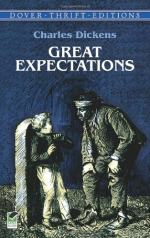|
|
Great Expectations Topic Tracking: Identity
Identity 1: Pip, as an orphan, does not have strong family ties to give him a sense of his own identity.
Identity 2: Pip's extreme guilt about stealing food from Mrs. Joe and lying to Joe show that he sees his identity as rooted in his behavior. If he does bad things, he can't feel like a good and worthy person.
Identity 3: When the convict returns to the marshes, revealing his identity to Pip by swirling a file in his drink, readers get the first hint that in this novel people are not always who they seem; if a character disappears mysteriously, he or she may well return, disguised, later.
Identity 4: The mystery in the novel continues when Pip's benefactor does not reveal his or her identity.
Identity 5: Shallow people, like Pumblechook, accept that a mere change in financial status is enough to make Pip a new person, worthy of a different sort of attention.
Identity 6: Wemmick's identity changes tremendously, based on his surroundings. In Jaggers' office, he is in "professional" mode, and wears an expressionless, "post office" look. At home, with the Aged P, he is warm and kind.
Identity 7: The occasional glimmers of recognition that Pip feels in Estella suggest that she may have a past linked to some other character.
Identity 8: Mr. Pocket, who is such a scattered wreck in his own home, is admired for his eloquent lectures on the management of children and servants. This suggests that one's true identity may not be reflected in what he or she can discuss.
Identity 9: Magwitch is a man with many identities, if his aliases are any indication. He's Provis, Magwitch, Pip's uncle, and Mr. Campbell.
Identity 10: Miss Havisham's identity, frozen for so many years in the form of the spurned bride, is finally changed when she realizes the horrible things she's done to other human beings. The fiery fate of her wedding garb might be seen as a symbolic destruction of that identity.
Identity 11: No longer able to see himself as a country blacksmith or a moneyed city boy, Pip leaves the country and forges his own identity through his own hard work.




